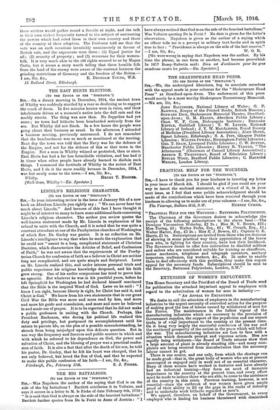LINCOLN'S RELIGIOUS CHARACTER.
[To ens Emma or THE " SpEoTAT0R.1
Srn,—In your interesting review in the Issue of January 8th of a new book on Abraham Lincoln you rightly say : " We can never hear too much about Lincoln." And because of this fact I have thought it might be of interest to many to learn some additional facts concerning Lincoln's religious character. The author you review quotes the well-known statement made by Mr. Lincoln in explanation of his refusal to unite with the Church, and it is noted that he was quite a constant attendant at one of the Presbyterian churches of Washington of which Rev. Dr. Gurley was pastor. It is no reflection on Mr. Lincoln's intelligence to say that when he made the explanation that he could not " assent to a long, complicated statement of Christian Doctrine, which characterizes the Articles of Belief, and Confessions of Faith," he was not aware that the requirements of the Presby- terian Church for confession of faith as a believer in Christ are neither long nor complicated, and are quite simple and Scriptural. Later on Mr. Lincoln realized this:, and under intense personal trials and public experience his religious knowledge deepened, and his faith grew strong. One of his earlier companions has tried to prove him an agnostic. But whatever he was in his youthful years, before he left Springfield for Washington he had declared himself convinced that the Bible is the inspired Word of God. Later on he said " I know I am right, because liberty is right, for Christ has said it, and Christ is God." We know from his own statements that in our great Civil War the Bible was more and more read by him, and more and more his guide and consolation, and more and more he believed in and made use of prayer. It is to be regretted that he did not make a publio profession in uniting with the Church. Perhaps, like President Buchanan, who during his political life realized this duty and privilege, but postponed its accomplishment until his return to private life, on the plea of a possible misunderstanding, he shrank from being misjudged upon this delicate question. But in one way the frequency and freeness and public manner in which and with which he referred to his dependence on God, the power and salvation of Christ, and the blessing of prayer was a practical confes- sion of faith. It is also a fact that after the death of his son, he told his pastor, Dr. Gurley, that he felt his heart was changed, that he not only believed, but loved the Son of God, and that he expected to make this public confession of his faith.—I am, Sir, &o.,
Pittsburgh, Pa., February 17th. S. J. num.


































 Previous page
Previous page